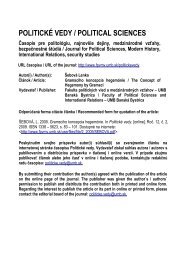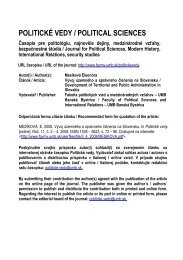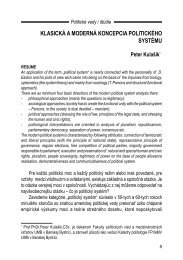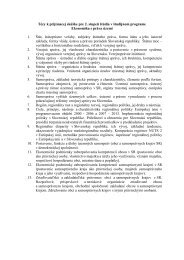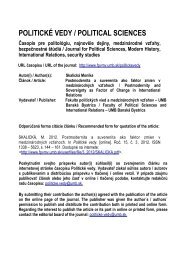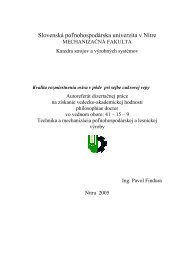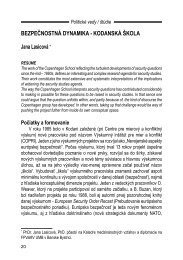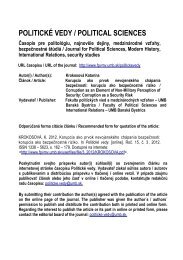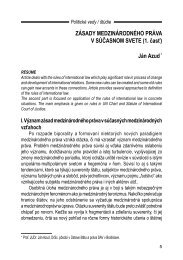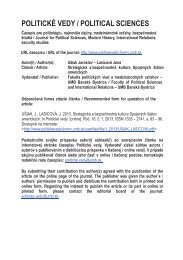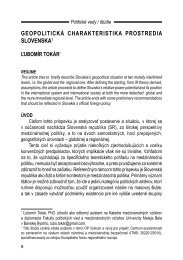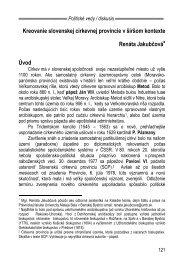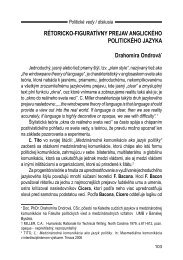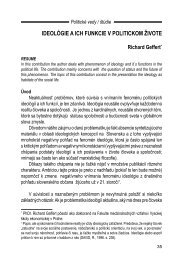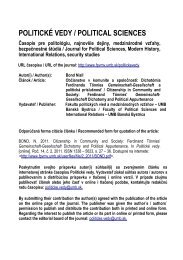MRAVNÃ VÃCHOVA V Å KOLÃCH NA SLOVENSKU A V ZAHRANI ÄÃ
MRAVNÃ VÃCHOVA V Å KOLÃCH NA SLOVENSKU A V ZAHRANI ÄÃ
MRAVNÃ VÃCHOVA V Å KOLÃCH NA SLOVENSKU A V ZAHRANI ÄÃ
You also want an ePaper? Increase the reach of your titles
YUMPU automatically turns print PDFs into web optimized ePapers that Google loves.
1. Circumstances of creation of ethical education project<br />
I seriously doubt the propriety of preparation and introduction of ethical education project at primary<br />
and secondary schools in 1990s. First of all, I have come to this conclusion on the basis of Dušan<br />
Sukuba´s statement that even though he was a member of the committee for the ethical education<br />
project, final decision was made elsewhere, outside the committee and thus someone else decided to<br />
introduce the pro-social education under the name ethical education as a compulsory subject at<br />
primary and secondary schools (Sukuba, 1999, s. 274-275).At the beginning of the whole process<br />
Miron Zelina uttered a similarly critical attitude to the pro-social character of the ethical education<br />
project in his review of the Slovak translation of Psichología y Education Para La Prosocialidad by<br />
R. Roche-Olivar. In his review he also drew attention to the inadequate translation of the book´s title<br />
(Ethical Education) as there is a significant difference between ethics and pro-social education, which<br />
constitutes the core of Olivar´s work as well as its original title. He perceived the one-sided emphasis<br />
of pro-sociality, ignorance of values, character and personality formation as one of the deficits of this<br />
book. Another circumstance contributing to doubts about the process of creation and introduction of<br />
this subject is the project team. It was lead by Ladislav Lencz, who clearly acknowledges his<br />
inclination to religion and Christian philosophy. His consultants were several foreign experts, such as<br />
Brian Wakeman, who claimed that he participated in preparation and introduction of the ethical<br />
education concept to the Slovak education system on the initiative of Christian Action Research and<br />
Education, a British organization that aims at introduction of Jewish-Christian values within the<br />
cultural heritage of the east European countries. According to his opinion, it was about implementing<br />
Christian values into secular environment (Wakeman, 1994, s. 439).<br />
Another paradox connected with the execution of the ethical education project is the fact that in 2004<br />
41% of ethics teachers in Slovakia graduated from theological faculties or completed study<br />
programmes of teaching of religion and ethics (Beňo, 2004, s. 4). It means that in Slovakia teachers of<br />
ethics, who should be neutral concerning ideology or religion, were prepared at theological faculties.<br />
Thus it is doubtful whether in plenty of cases ideological or religious neutrality of teachers and<br />
educational process of ethics in Slovakia was preserved. Evidence can be provided by the list of<br />
subjects studied by future teachers of religion – ethics as implemented at the Greek Catholic Faculty,<br />
University of Prešov in 1997/1998. 1<br />
Ladislav Lencz, the author of the ethical education concept, admitted himself that Olivar´s theory is<br />
applied only in certain parts of Spain, Portugal and in the countries of Latin America (Lencz, 1994, s.<br />
444 445). On this basis, we should ask why a theory so little approved has become the core or basis for<br />
such extensive application in Slovakia. Some critics of this particular concept in Slovakia claim that<br />
Olivar´s theory is mostly approved by and applied in countries with strong position of the Catholic<br />
Church (Beňo, 2004, s. 4; Škoda, 2004, s. 4).<br />
In my opinion, perception of the ethical education project in society corresponds with the ways of its<br />
creation and introduction in schools, i. e. it is perceived as a supplement to religious education.<br />
Retraining of teachers of various subjects to teachers of ethical education lacking sufficient knowledge<br />
of ethics and moral, values, norms, rules etc. during several months’ courses contributed to the<br />
negative perception of the project as well. Another “disqualification” of the subject is the fact that it is<br />
not graded, which causes feeling of insignificance among other teachers and public. Furthermore, in<br />
some cases this educational subject is only used to increase the number of lessons taught by some<br />
teachers in order to provide them with full-time employment. All this contributes to the low status of<br />
the subject among other teachers as well as among public.<br />
1 Only 3 out of 41 subjects studied during the five-year Master´s studies were related to ethics: Christian<br />
Morality, History of Ethics and Methodology of Ethics. 6 semesters out of 124 semesters were devoted to the<br />
studies of Ethics, 5 semesters were devoted to Psychology, 4 semesters to Philosophy and Pedagogy (this<br />
constitutes 15.3% of the overall studies contents) and remaining semesters were devoted to theological<br />
disciplines. I suppose that the situation was the same or very similar at other theological faculties preparing<br />
teachers of “ethical education”.<br />
283



